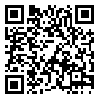BibTeX | RIS | EndNote | Medlars | ProCite | Reference Manager | RefWorks
Send citation to:
URL: http://tumj.tums.ac.ir/article-1-7655-en.html
2- Department of Clinical Laboratory Sciences, Islamic Azad University, Tehran Medical Sciences Branch, Tehran, Iran. ,
3- Department of Cell and Molecular Biology, University of Mazandaran, Mazandaran, Iran.
4- Department of Hematology and Oncology, Medical University of Shahid Beheshti, Tehran, Iran.
Background: Kirsten rat sarcoma (KRAS) gene is a target of genetic alterations which are diagnostic and prognostic biomarkers in patients with metastatic colorectal cancer who are treated with monoclonal anti-EGFR antibodies such as cetuximab and panitumumab. KRAS mutations are seen in 35-42% of patients with colorectal cancer. The high frequency of these mutations in colorectal cancer represents their high potential as a biomarker in early diagnosis of cancer. This study was done to evaluate the frequency of KRAS gene mutations in a small population of Iranian patients suffering from colorectal cancer.
Methods: 50 formalin-fixed paraffin-embedded tissue blocks with colorectal cancer (CRC), already confirmed by histopathology and immunohistochemistry testing, were received to Payvand Clinical and Specialty Laboratory, Tehran, from across the country in 2015. DNA was extracted from the tissue blocks and its quality was then evaluated. The reverse dot blotting method was used to evaluate KRAS gene mutations.
Results: KRAS mutations were found in 42% of the study patients. 30% and 12% of the mutations were found in codon 12 and codon 13, respectively. Moreover, no mutation was found in codon 61. Results also showed that the most frequency of samples examined belonged to male with 68% (average age of 56 years old) and then to female with 32% (median age of 54.8 years old).
Conclusion: This study was performed to evaluate the frequency of KRAS gene mutations in Iranian colorectal cancer patients. According to the study results, the frequency of KRAS mutations was consistent with that of other countries, reported in previous studies. The high prevalence of these mutations in patients with colorectal cancer indicates the important role of these genes in this group of patients. Thus, the presence of these mutations can be used as a suitable biomarker for evaluation of response to targeted therapies in patients suffering from colorectal cancer.
| Rights and permissions | |
 |
This work is licensed under a Creative Commons Attribution-NonCommercial 4.0 International License. |





